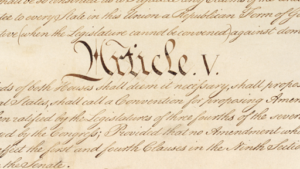As legislatures gather for their 2019 sessions, many will be considering resolutions aimed at reforming our dysfunctional federal government.
The resolutions arise because Article V of the U.S. Constitution empowers the people, acting through their state legislatures, to order what the Constitution calls a “convention for proposing amendments”—a gathering of representatives from the state legislatures. The convention may, by a majority vote of the states, formally suggest constitutional amendments.
If 34 states pass resolutions (called “applications”) for a convention to address particular topics, Congress must call it. However, no proposal becomes a legal amendment unless approved by three fourths of the states (38). And as its name suggests, a convention for proposing amendments is not, as some mistakenly assert, a “constitutional convention”. (The Constitution does not authorize a constitutional convention.) The gathering is limited to proposing prescribed amendments for state consideration. Once it makes its recommendations, it dissolves.
The American Founders accurately foresaw that amendments could be powerful tools for good. Through the amendment process, we adopted the Bill of Rights, abolished slavery, ensured women could vote, and limited the president to two terms. The Founders provided the convention method so the people could respond if the federal government ever became abusive or dysfunctional. This procedure is an important constitutional right.
Most Americans agree the federal government needs an overhaul. For one thing, Congress has proved unable to balance its budget. Although we all recognize that deficits sometimes are necessary, Congress no longer balances its budget ever. Year after year, in prosperity or recession, war or peace, the public debt grows and grows.
In addition, the federal bureaucracy has trespassed into areas where it does more harm than good. And although our Constitution was designed for a system of citizen-politicians, we are now governed largely by a privileged political class. Sometimes members of this class even pass down their positions to their spouses and children.
In response to problems like these, the Convention of States project, is promoting a uniform resolution already approved by 12 state legislatures. It asks for a convention to propose reforms in three targeted areas:
* Fiscal restraints on the federal government, including a balanced budget amendment. Nearly all states have balanced budget provisions in their constitutions—most inserted after several states went bankrupt during the 19th century. Balanced budget rules don’t always work perfectly, but they have prevented state bankruptcies ever since.
* Amendments to scale back federal authority in non-critical areas.
* Term limits on members of Congress and federal officials, including Supreme Court justices—thereby applying the principle to them that we already apply to the president.
The amendment procedure is not a partisan device. It is a valuable constitutional right available to all Americans who want to improve their federal ![]() government. Other groups favor using this procedure to adopt campaign finance reform, regulatory reform, or a legislative single subject rule to reduce congressional “log-rolling.
government. Other groups favor using this procedure to adopt campaign finance reform, regulatory reform, or a legislative single subject rule to reduce congressional “log-rolling.
Unfortunately, there are people who don’t want you to exercise this constitutional right, just as there are those who want to suppress others’ right to vote. The most powerful opponents are (surprise!!) based in Washington, D.C. They traffic in misinformation first widely disseminated during the 1960s and 1970s to stymie amendments suggested at that time. Whenever it looks like people might use the convention process to adopt reforms, opponents republish the same misinformation.
Opponents sometimes are assisted by academics who have never published any research on Article V but choose to pontificate on the subject anyway, repeating claims long disproved or posing questions long answered.
Citizens interested in using the amendment process as our Founders intended can find truthful, non-partisan information at the Article V Information Center website. Or you can check out my new legal treatise, The Law of Article V.
Rob Natelson is senior fellow in Constitutional Jurisprudence at the Independence Institute, a free market think tank in Denver. He has published extensively on the Constitution and is the author of The Original Constitution: What It Actually Said and Meant. A version of this article originally appeared in the Daily Caller.


